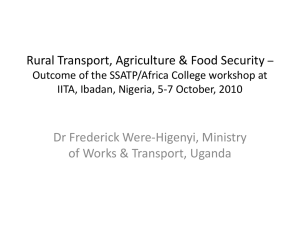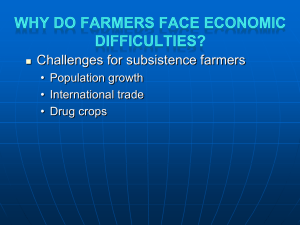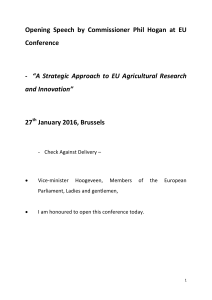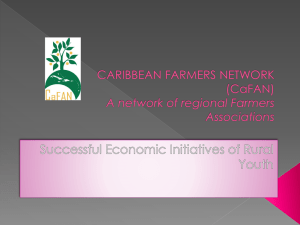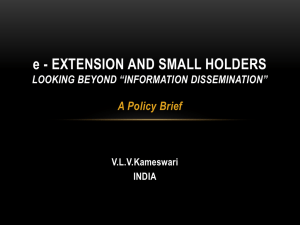Main Contents
advertisement
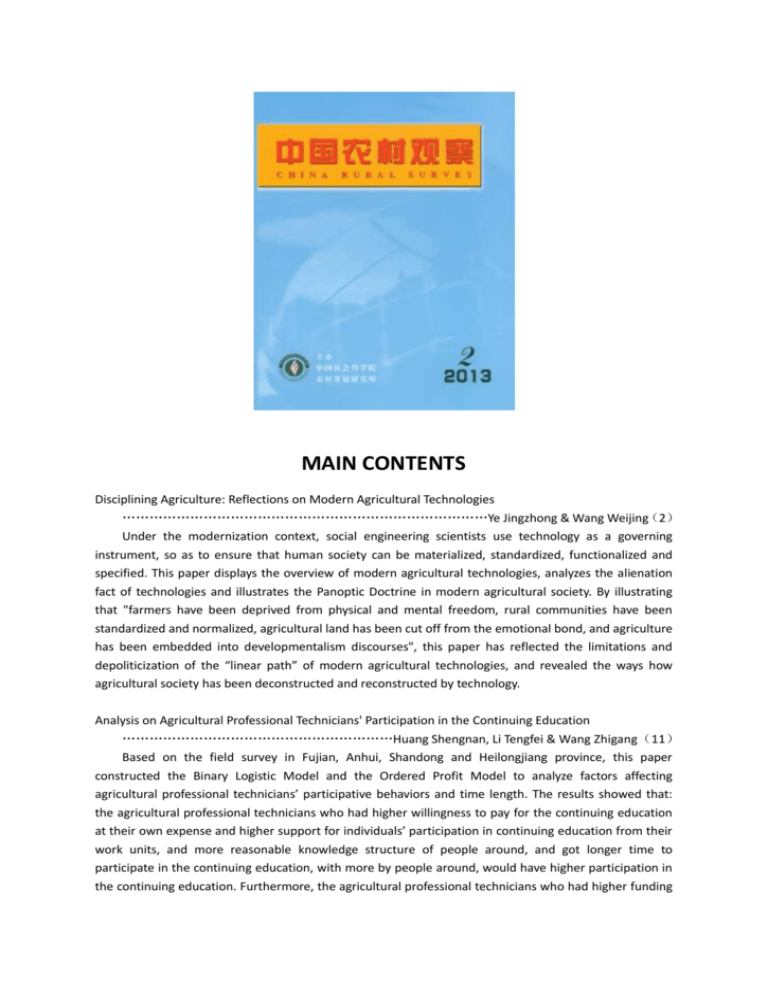
MAIN CONTENTS Disciplining Agriculture: Reflections on Modern Agricultural Technologies ………………………………………………………………………Ye Jingzhong & Wang Weijing(2) Under the modernization context, social engineering scientists use technology as a governing instrument, so as to ensure that human society can be materialized, standardized, functionalized and specified. This paper displays the overview of modern agricultural technologies, analyzes the alienation fact of technologies and illustrates the Panoptic Doctrine in modern agricultural society. By illustrating that "farmers have been deprived from physical and mental freedom, rural communities have been standardized and normalized, agricultural land has been cut off from the emotional bond, and agriculture has been embedded into developmentalism discourses", this paper has reflected the limitations and depoliticization of the “linear path” of modern agricultural technologies, and revealed the ways how agricultural society has been deconstructed and reconstructed by technology. Analysis on Agricultural Professional Technicians' Participation in the Continuing Education ……………………………………………………Huang Shengnan, Li Tengfei & Wang Zhigang(11) Based on the field survey in Fujian, Anhui, Shandong and Heilongjiang province, this paper constructed the Binary Logistic Model and the Ordered Profit Model to analyze factors affecting agricultural professional technicians’ participative behaviors and time length. The results showed that: the agricultural professional technicians who had higher willingness to pay for the continuing education at their own expense and higher support for individuals’ participation in continuing education from their work units, and more reasonable knowledge structure of people around, and got longer time to participate in the continuing education, with more by people around, would have higher participation in the continuing education. Furthermore, the agricultural professional technicians who had higher funding support ratio from the government and work unit would have more time participated in the continuing education. Analysis of Chinese Farmers' Vocational Skill Training Status ………………………………………………………………………………………Luo Wanchun(21) This paper analysis Chinese farmers' vocational skill training status and training needs by using household survey data. The main findings are as follows:①Chinese farmers training is mainly organized by government with other organizations actively participating in. Most of the farmers who are engaged in agriculture and animal husbandry take part in agricultural technology training, while the other farmers mainly attend non-agricultural skill training. Farmers often participate in agricultural technology training in the village and non-agricultural skill training outside the village. Training organized by government and village committee is mainly held in the village. Classroom instruction is the main training method. Farmers face to light financial burden in agricultural technology training while heavy financial burden in other training. Non-agricultural skill training help the farmers with lower level of education obtain employment. Most of the farmers are pleased with the training, but there is some problem should be resolved in training, for example, training content is divorced from needs, and training frequency is low. ②The farmers are strongly willing to participate in training. Demand for farming and breeding technique is significantly for all farmers. To promote the healthy development of farmers' vocational skill training, this paper gives the following suggestion: Firstly, government should increase financial investment in training for farmers. Secondly, it is necessary to organize training according to farmers’ needs. Thirdly, effectiveness of training should be concerned and it is necessary to help farmers achieve employment. Optimum-Scale Management: Toward an Agriculture Mode of Steady-Growth ………………………………………………………………………………………Cao Dongbo(29) There have been a long historical path and unique logic in the formation of the idea and policy of optimum-scale management in agriculture. This paper interprets the logic of agricultural policy and land policy since the rural reform begins. This will contribute to our understanding on the origin of the present agricultural family management system and the constraints of its scale. Now, it has formed three kinds of main modes: the family farm, cooperative organization and capital agriculture. Among them, the family farm is a kind of "ideal type", and it should be deserved our supports. The experiences of developed regions are important. However, we must prevent the distortion and leakage in the process of the policy implementation. Who is Running Overgrazing? Variation Analysis of Herdsmen with Different Scales of Pastureland …………………………………………………………………………Jin Leshan & Hu Zhentong(37) Overgrazing is the main cause of grassland degradation in China. Based on the investigation in Siziwang Banner, Inner Mongolia Autonomous Region, it is found that the main group of the grassland overgrazing is herdsmen with medium or small sized pasture land. The smaller the pasture land is, the more likely overgrazing takes place, and the higher the degree of overgrazing is. The fundamental reason for the medium or small sized herdsmen to run overgrazing is to keep family account balance and promote family income. The national grassland ecological protection policy, especially the “Balancing Grass and Livestock" policy does not take into account the differences between the herdsmen. It cannot improve the income of the medium or small sized herdsmen, and it is therefore very hard to arouse the enthusiasm of the medium or small sized herdsmen to protect the grassland, who carry out most of task of livestock reduction for balancing grass and livestock. The research findings have some policy implications. The most important one is that herdsmen income support policy should be made which ought to be independent of size of pasture land. Small or medium sized herdsmen should be targeted in reducing overgrazing. Income support policy will discourage overgrazing of small or medium sized herdsmen, who are the major overgrazing groups. Governments and Capital to Rural China and Peasants’ re-cooperation ……………………………………………………………………… Lu Wenrong & Lu Hanlong(44) Nowadays in china, different departments of the government and the capital both flowing to the rural area bring a new social-economic structure, which the rural country have to face. Based on this, the distributed peasants cultivate the village autonomy with the previous resource of collaboration. This autonomy leads to the failure of some governmental projects and the capital. Here are two enlightens .The first is that the government and the capital to rural china cause a new opportunity for the peasants’ re-cooperation. The second is that the re-cooperation of peasants should be the premise of the policy of governments and capital to rural china. “Face-Off, Get It Done!” ——the game between suburban farmers and township government in Hangzhou ……………………………………………………………………………………Zhang Bingxuan(57) Mechanism of game between farmers and governments is a key clue to understand rural governance after the de-collectivization in China. This paper questions long-held assumptions of the dichotomy of government in the mind of farmers, which central government is “benign”, and local government is “malign”, and takes a case of A township in Hangzhou city, researches the behavior and mechanism of game between suburban farmers and township government in rural society. It concludes that the movements of de-collectivization have weakened the rural traditional informal routine organization structure of stability maintenance, the rapid process of rural industrialization and urbanization is leading to expansion of the self-interest of the township government, and enhancement of autonomy in the policy process, and intensification of conflict between farmers and township government. Accordingly, township government represses them in the way of bureaucratic and organizational measures. The increasingly self-reinforcing mechanism of “Face-off, Get it done!” is hard to promote the transformation of rural governance. Can Urbanization Promote Balancing Urban-Rural Development? ——The Study on the Base of Data from 1991 to 2010 …………………………………………………………………………………Libin & Ma Jiu-jie(65) An empirical study on the commodity housing price fluctuations impact of the rural CPI ………………………………………………………………………Yang Dong & Zhao Shukuan(75) The Effect of New Rural Cooperative Medical Scheme and Medical Assistance System on Reducing the Poor Rural Resident’s Financial Burden of Access to Health Care: Based on the Survey of the Poor Rural Resident in Baizhou, Chibi and Hechuan of China ……………………………………………………………………Fang Liming & Qiao Dongping(80) CHINA RURAL SURVEY (CRS) is published bimonthly by Institute of Rural Development of Chinese Academy of Social Sciences. Editor in Chief:Li Zhou Deputy Editor in chief:Du Zhixiong Address:No.5, Jianguomennei Ave.,Beijing, 100732, China Code No.BM4476 Overseas Distributor:China International Book

